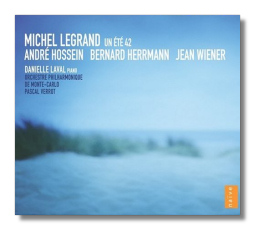
The Internet's Premier Classical Music Source
Related Links
- Latest Reviews
- More Reviews
-
By Composer
-
Collections
DVD & Blu-ray
Books
Concert Reviews
Articles/Interviews
Software
Audio
Search Amazon
Recommended Links
Site News
 CD Review
CD Review
Michel Legrand

Summer of '42
- Michel Legrand: Piano Concertino "Un été 42"
- André Hossein: Piano Concerto #3 "Una Fantasia"
- Bernard Herrmann: Concerto Macabre for Piano and Orchestra
- Jean Wiener: Piano Concerto #1 "Franco-Américain"
Danielle Laval, piano
Monte-Carlo Philharmonic Orchestra/Pascal Verrot
Naïve V4979 DDD 54:51
All four of these composers are most famous for writing film music, although they wrote concert music as well. (Of the four, only Michel Legrand is still alive, and (we hope) still writing.) It is Legrand who gets the largest font on the cover of this CD. The music is from the film "Summer of '42," of course – some might remember a vocal version of this melody with the title "The Summer Knows." To call this a concertino is something of a stretch, however, because it lasts all of 3:53 in this performance. Better, perhaps, to say that this is simply a lush and romantic arrangement of "The Summer Knows" for piano and orchestra, and to leave it at that.
Bernard Herrmann's more substantial Concerto Macabre also comes from an American film – in this case, the nearly forgotten "Hangover Square," about which Pascal Rivoire's booklet notes say not a word. In the film's climax, a composer has murdered his deceiving mistress. Coming unglued, he sets fire to the concert hall in which he is premiering his new piano concerto. The orchestra and audience scatter in alarm, and the composer is left to complete his concerto alone in the inferno. Macabre indeed. This twelve-minute concerto sounds like what Liszt's Mephisto Waltz might have sounded like had the devil preferred a tarantella instead. The piano writing is flashy at first, and later stark and doom-haunted as Herrmann depicts the figuratively and literally collapsing world of the composer.
Less known than these other two composers is Aminholla André Hossein, who came to the film music genre quite late in his career. (His son, the actor and director Robert Hossein, asked him to score his first film in 1956, when the composer was already in his late 40s.) This so-called "Fantasy Concerto" is not associated with a film, however. In three short movements (the total timing is under 13 minutes), Hossein drops large hints about his Uzbekistani background – he was born in Samarkand in 1907. The music has one foot in the West and the other in the East, and is attractive and lightweight.
The last composer represented here is the Frenchman Jean Wiener. His "Franco-American" concerto was written in 1924, and was inspired (we are told in the booklet notes) by American music, especially by the music of George Gershwin. Don't expect a Rhapsody in Blue knock-off, however. Wiener's concerto is cool and neoclassical, incorporating elements of jazz for spice, not as the main ingredient.
Laval is a capable pianist, but other pianists have been more assertive and frightening in the Herrmann. Verrot and the Monte-Carlovians give her excellent support, and Naïve's engineers make all the performers sound good. This is a short CD, and not a very serious one, but it is worth exploring particularly for the works by Wiener and Hossein.
Copyright © 2004, Raymond Tuttle




















